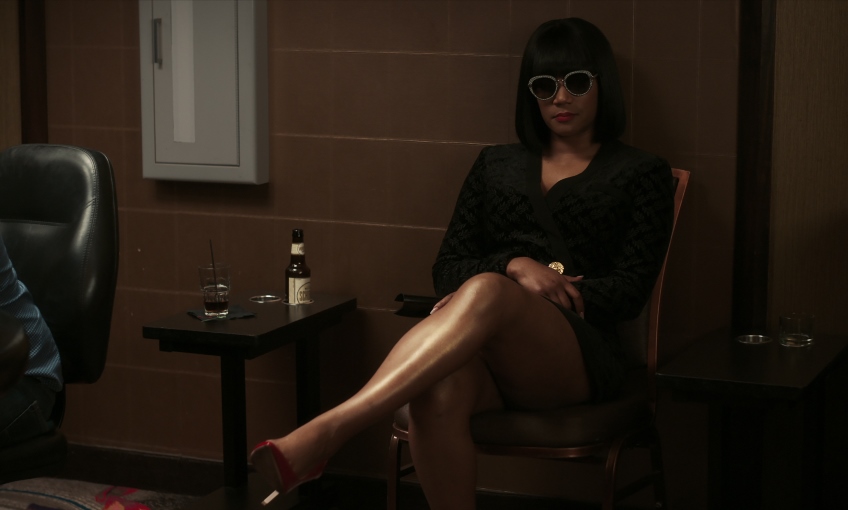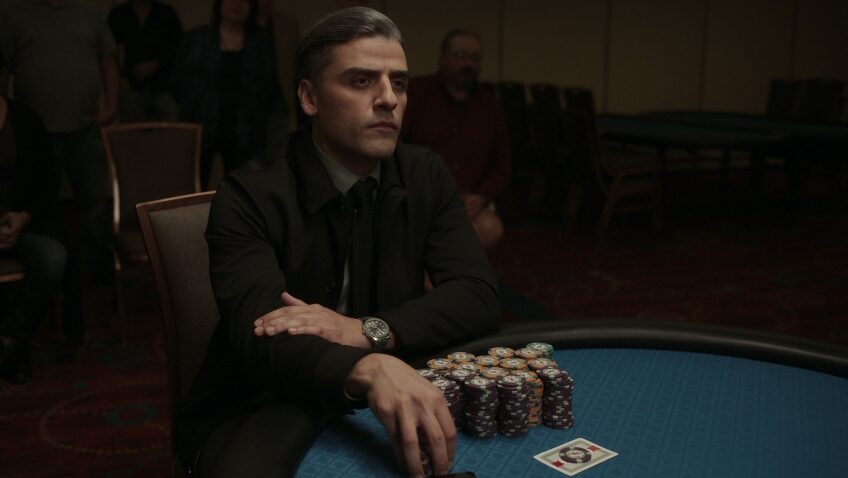Joyce Glasser reviews The Card Counter (November 5, 2021) Cert 15, 112 mins.
Paul Schrader became famous in the 1970s for two scripts for Martin Scorsese, Taxi Driver and Raging Bull, but in the 1980s he wrote and directed a couple of notable films of his own: Blue Collar and American Gigolo. It wasn’t until 2019 however, that audiences were reminded of his talent with First Reformed a film that arguably surpassed anything that he had written and directed before. With his new film, The Card Counter, you might be wondering if he isn’t taking on his exact contemporary, Oliver Stone, as the concerned and critical chronicler of contemporary America.
In First Reformed a priest, and former military chaplain, struggling with a crisis of faith after his son was killed in Iraq, becomes conscious of the financial ties between his church and a factory owner after a parishioner refuses to bring children into a polluted world with no future. Guilt and Iraq play a key role in The Card Counter, too, a story that features another of Schrader’s morally challenged, tormented male anti-heroes. There are echoes of Schrader’s 1992 film Light Sleeper, for its memorable, brooding score, written by Levon Been, the son of Light Sleeper composer Michael Been, its focus on addiction, and its ending.
With his greased back, slightly greying hair, pallid skin, smart, but understated clothes, and quiet, observant demeaner William ‘Tell’ Tillich (Oscar Isaac) bypasses casino hotels preferring anodyne roadside motels, where he conducts a kind of OCDC routine. He brings two suitcases from his car in which there are white sheets which he wraps around the furniture with string, after removing all the motel fittings, including the phone. He then works on his game with a bottle of whiskey.
Tell muses, “I never considered myself as someone suitable for incarceration.” This is the first of two observations that suggest Tell does not know himself as well as he should. Tell spent eight years incarcerated at Fort Leavenworth, a military corrections prison, where, as we learn in a narrated segment, he had three main activities. He learned to read, and he read avidly.
He learned to count cards and he thought about penitence for the horrors of his job at Abu Ghraib which we are shown in flashback. Tell was a scapegoat for the sadistic civilian torture expert, Major John Gordo (Willem Dafoe) who identified the young MP as a malleable type. If you have seen the film The Report, you will know all about the civilian company advising the CIA on “enhanced interrogation techniques” in the wake of 9/11, which techniques turn out to be bogus.

Having served his sentence, Tell transferred the routine of prison to the routine of the midlevel gambling circuit, where every day is the same. The only difference is that now, he is confined to the interiors of windowless, soulless casinos (atmospherically rendered by Shrader’s regular cinematographer Alexander Dynan) where the bars on the doors are invisible. When asked why he gambles nonstop with no outside activities or hobbies, he answers, “it passes the time.”
Tell’s strategy is to gamble under the radar, which is why he sticks to smaller casinos. As he later explains to La Linda (Tiffany Haddish) an old acquaintance who is now recruiting and managing gamblers for a stable of investors, casinos “don’t mind card counters, or winners. They mind card counters who win big.” Note the “La” or “the” before the proper name of Linda. Just as La Linda finds William Tell’s name suspicious, hers is an odd one, too.
Tell declines La Linda’s proposal. “There is a weight created by backers”, he writes in a journal, and he already has the weight on his back from his past actions, “that can never be removed.”
Then one day in between games, he notices a photo of Major John Gordo, a speaker at a Security Convention in the hotel. It is a familiar face but the man he remembers with that face is no more Major John Gordo (Willem Dafoe) than he is William Tell. Tell slips into a seat and within minutes gets up to leave when he is accosted by a young man named Cirk (Tye Sheridan). The “C” is hard like K: no one has straightforward names here even if they have their own.

Cirk is the son of Roger Baufort, who served with Tell at Abu Ghraib. Baufort worked with Tell “guarding” the prisoners, but he escaped incarceration because he did not appear in the obscene photographs with the prisoners that were used to single out Tell. But Baufort did not escape his PTSD and the story Cirk tells is tragic. Cirk has dropped out of university to track down Tell and enlist him in a revenge plan.
Tell discourages Cirk’s plan. He knows too well “it will eat you up inside”, which is why he fills every waking minute with high-concentration card games. Instead Tell invites Cirk to travel around with him, all expenses paid. Tell has found his route to redemption. He decides to spend a year in La Linda’s stable to make just enough money to give Cirk a fresh start in life – and then he’s gone.
When Tell and La Linda sleep together, Tell becomes unwittingly positioned as the bread winner in a curious, needy family. But here is the second observation that suggests that Tell does not know himself as well as he thinks. During a round of poker he tells us about the importance of reading other card players’ faces, for though blackjack is his game, Tell plays everything, including poker a game of bluff. But is Tell reading Cirk?
The story depends on the chemistry between the three characters working, and it does. Both Tell and Cirk comment on how they like La Linda, and we can see why, as we do too. She has had a rough hand in life, but is cheery, dignified, sincere and sincerely curious about people. She is attracted to everything about Tell, including his self-sufficiency and the mystery about him. Her genuine efforts to connect with him reveal another side to Tell and expose his vulnerability.
If the film has a drawback, it is the climax, which, inevitable as it is, is identical to that in Light Sleeper (with just the characters changed), but here seems rushed and anti-climactic. In this climax it is also clear that Dafoe is not the choice for the character of Gordo. He’s a great actor, but this is one role that eludes him.




